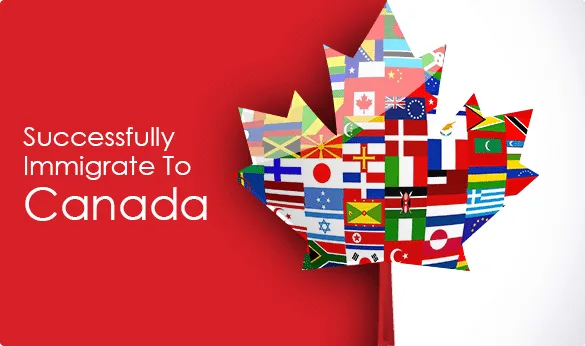How to Immigrate to Canada
How to Immigrate to Canada
Canada is known for its welcoming attitude towards immigrants, its high quality of life, and its vast opportunities for personal and professional growth. With its diverse culture, excellent healthcare system, and strong economy, it’s no wonder that Canada is a top destination for individuals and families looking to start a new life. If you’re considering immigrating to Canada, this comprehensive article will walk you through the various pathways, eligibility criteria, and steps involved in the process on how to immigrate to Canada.
Understanding the Pathways to Immigration
Canada offers several immigration programs, each designed to cater to different types of immigrants. The main categories include:
- Express Entry
- Provincial Nominee Program (PNP)
- Family Sponsorship
- Business Immigration
- Student Pathway
- Refugees and Asylum Seekers
- Self-Employed Persons Program
- Temporary Resident Visa (Visitor Visa)
- Work Permits
Lets go over these options on How to Immigrate to Canada:
1. Express Entry
Express Entry is the most popular immigration pathway for skilled workers. It is a points-based system that manages applications for three federal economic immigration programs:
- Federal Skilled Worker Program (FSWP)
- Federal Skilled Trades Program (FSTP)
- Canadian Experience Class (CEC)
Eligibility Criteria
To be eligible for Express Entry, you must:
- Meet the criteria of at least one of the federal immigration programs.
- Take an approved language test to prove proficiency in English or French.
- Have your foreign education credentials assessed by a designated organization (if applicable).
- Obtain a minimum score on the Comprehensive Ranking System (CRS), which evaluates factors such as age, education, work experience, and language skills.
Application Process
- Create an Online Profile: Complete an online Express Entry profile where you provide information about your skills, work experience, language ability, education, and other personal details.
- Receive an Invitation to Apply (ITA): If you meet the eligibility criteria and score high on the CRS, you will receive an ITA for permanent residence.
- Submit an Application: Once you receive an ITA, you have 60 days to submit a complete application for permanent residence, including supporting documents.
- Medical Exam and Police Clearance: Undergo a medical examination and obtain police clearance certificates.
- Wait for Approval: If your application is approved, you will receive a Confirmation of Permanent Residence (COPR) and a visa.
2. Provincial Nominee Program (PNP)
PNP allows Canadian provinces and territories to nominate individuals who wish to immigrate to Canada and settle in a particular province. Each province has its own criteria and streams targeting students, business people, skilled workers, and semi-skilled workers.
Eligibility Criteria
Eligibility criteria vary by province, but generally include:
- A job offer from an employer in the province.
- Relevant work experience.
- Language proficiency.
- An intention to reside in the nominating province.
Application Process
- Choose a Province: Research and select the province you wish to move to.
- Apply for Nomination: Apply directly to the province or through the Express Entry system (if the province has an Express Entry stream).
- Receive a Nomination: If the province nominates you, you will receive a Provincial Nomination Certificate.
- Apply for Permanent Residence: With your nomination, you can apply for permanent residence through the Express Entry system or directly to Immigration, Refugees and Citizenship Canada (IRCC).
3. Family Sponsorship
Family Sponsorship allows Canadian citizens and permanent residents to sponsor their relatives to come to Canada. Eligible relatives include spouses, common-law partners, conjugal partners, dependent children, parents, grandparents, and, in some cases, other relatives.
Types of Sponsorship
- Spouse, Common-Law, or Conjugal Partner Sponsorship: For sponsoring a spouse, common-law partner, or conjugal partner.
- Parental and Grandparent Sponsorship: For sponsoring parents and grandparents.
- Dependent Child Sponsorship: For sponsoring dependent children.
Eligibility Criteria
To be eligible to sponsor a relative, you must:
- Be at least 18 years old.
- Be a Canadian citizen or permanent resident.
- Sign an agreement to support your relative financially.
- Meet income requirements (for sponsoring parents and grandparents).
Application Process
- Submit Sponsorship Application: Submit an application to sponsor your relative to IRCC.
- Submit Permanent Residence Application: Your relative must submit an application for permanent residence.
- Undergo Processing: Both applications will be processed, and you may need to provide additional documents or attend an interview.
- Receive a Decision: If approved, your relative will receive permanent residence.
4. Business Immigration
Business Immigration programs are designed for individuals who can invest in or start businesses in Canada, contributing to the economy and creating jobs.
Types of Business Immigration Programs
- Start-Up Visa Program: For entrepreneurs with innovative business ideas.
- Self-Employed Persons Program: For individuals with relevant experience in cultural activities or athletics.
- Investor and Entrepreneur Programs: Offered by some provinces under the PNP.
Eligibility Criteria
Criteria vary by program, but generally include:
- Relevant business experience.
- A viable business plan.
- Sufficient funds to invest in the business.
- Language proficiency.
Application Process
- Choose a Program: Select the business immigration program that fits your profile.
- Submit Application: Submit your application along with supporting documents, such as a business plan and proof of funds.
- Undergo Processing: Attend an interview (if required) and provide additional information as requested.
- Receive a Decision: If approved, you will receive a visa and can start your business in Canada.
5. Student Pathway
Student Pathway allows international students to study in Canada and potentially transition to permanent residence.
Steps to Immigrate as a Student
- Apply to a Canadian Institution: Obtain a letter of acceptance from a designated learning institution (DLI).
- Apply for a Study Permit: Submit a study permit application to IRCC.
- Study in Canada: Complete your studies and gain Canadian credentials.
- Post-Graduation Work Permit (PGWP): Apply for a PGWP to gain Canadian work experience.
- Transition to Permanent Residence: Apply for permanent residence through programs like Express Entry or PNP.
6. Refugees and Asylum Seekers
Refugees and Asylum Seekers can seek protection in Canada if they are fleeing persecution, war, or violence.
Eligibility Criteria
To be eligible for refugee status, you must:
- Be outside your home country and unable to return due to a well-founded fear of persecution.
- Meet the definition of a Convention refugee or a person in need of protection.
Application Process
- Claim Asylum: Make an asylum claim at a port of entry or online.
- Attend a Hearing: Attend a hearing with the Immigration and Refugee Board of Canada (IRB).
- Receive a Decision: If your claim is accepted, you will be granted refugee status and can apply for permanent residence.
7. Self-Employed Persons Program
Self-Employed Persons Program is designed for individuals with relevant experience in cultural activities or athletics who intend to be self-employed in Canada.
Eligibility Criteria
To be eligible, you must:
- Have relevant experience in cultural activities or athletics.
- Be willing and able to make a significant contribution to the cultural or athletic life of Canada.
- Meet the program’s selection criteria, which include experience, education, age, language ability, and adaptability.
Application Process
- Submit an Application: Complete and submit the application forms along with supporting documents.
- Undergo Processing: Attend an interview (if required) and provide additional information as requested.
- Receive a Decision: If approved, you will receive permanent residence.
8. Temporary Resident Visa (Visitor Visa)
Visitor Visa allows individuals to visit Canada for tourism, family visits, or business purposes for a temporary period.
Eligibility Criteria
To be eligible, you must:
- Have a valid travel document (passport).
- Be in good health.
- Have no criminal or immigration-related convictions.
- Convince an immigration officer that you have ties to your home country.
- Convince an immigration officer that you will leave Canada at the end of your visit.
- Have enough money for your stay.
Application Process
- Submit an Application: Complete and submit the application forms along with supporting documents.
- Undergo Processing: Attend an interview (if required) and provide additional information as requested.
- Receive a Decision: If approved, you will receive a visitor visa.
9. Work Permits
Work Permits allow individuals to work in Canada for a specific period and can be employer-specific or open.
Types of Work Permits
- Employer-Specific Work Permit: Allows you to work for a specific employer in Canada.
- Open Work Permit: Allows you to work for any employer in Canada.
Eligibility Criteria
Eligibility criteria vary by type of work permit but generally include:
- A job offer from a Canadian employer.
- A positive Labour Market Impact Assessment (LMIA) (if required).
- Relevant work experience and qualifications.
- Language proficiency (if required).
Application Process
- Obtain a Job Offer: Secure a job offer from a Canadian employer.
- Apply for an LMIA: Your employer may need to apply for an LMIA from Employment and Social Development Canada (ESDC).
- Submit an Application: Complete and submit the application forms along with supporting documents.
- Undergo Processing: Attend an interview (if required) and provide additional information as requested.
- Receive a Decision: If approved, you will receive a work permit.
Additional Work Permit Programs
- Intra-Company Transfers (ICT): Allows international companies to transfer employees to their Canadian branches.
- Global Talent Stream: Fast-tracks work permits for highly-skilled workers in specific occupations.
Final Steps: Preparing for Life in Canada
Once your immigration application is approved, it’s essential to prepare for your new life in Canada:
- Plan Your Move: Arrange for travel, find accommodation, and pack essentials.
- Settle In: Obtain a Social Insurance Number (SIN), open a bank account, and get health insurance.
- Integrate: Learn about Canadian culture, join community groups, and build a network.
How Can we Help?
As you can see, there are many different options on how to immigrate to Canada. Immigrating to Canada is a multi-step process that requires careful planning and preparation. By understanding the different pathways and their requirements, you can choose the best option for your situation. Whether you are a skilled worker, entrepreneur, student, or refugee, Canada offers numerous opportunities for those seeking a better life. Stay informed, Akrami & Associates Immigration Law Firm can help you every step of the way.
Contact us today!
416-477-2545
info@thevisa.ca
Latest Immigrations News

December 5, 2025
THE ULTIMATE GUIDE TO HUMANITARIAN & COMPASSIONATE (H&C) APPLICATIONS IN CANADA
THE ULTIMATE GUIDE TO HUMANITARIAN & COMPASSIONATE (H&C) APPLICATIONS IN CANADA Understanding When, Why, and How to Apply for Permanent Residence on Humanitarian Grounds What Is an H&C Application? A Humanitarian and Compassionate (H&C) application is a last-resort pathway for individuals who are in Canada and do not [...]

September 11, 2025
Canada Super Visa: Step-by-Step Guide for Parents and Grandparents
For many Canadian citizens and permanent residents, bringing parents or grandparents to Canada for extended visits is more than just a wish, it’s a heartfelt need. While most people first consider the traditional visitor visa, there is another option designed specifically for family reunification: Super Visa applications. [...]

August 23, 2025
Intra-Company Transfer (ICT) Work Permit, Your Complete Guide to Working in Canada
For multinational companies, moving key talent across borders is often essential for growth and operational success. The Intra-Company Transfer (ICT) Work Permit provides a streamlined pathway to bring experienced employees to Canada without the time-consuming Labour Market Impact Assessment (LMIA) process. For foreign professionals, it’s more than [...]

Book a Conslutation
One of our Representatives will
assist you with your matter. Book Now!
Click here

Call us for
more Information
+1-416-477-2545
Toll Free: 1-877-820-7121
Click here

Write Us (Online Form)
Complete our form and one of our
Representatives will contact you.
Click here
Subscribe To Our Newsletter





